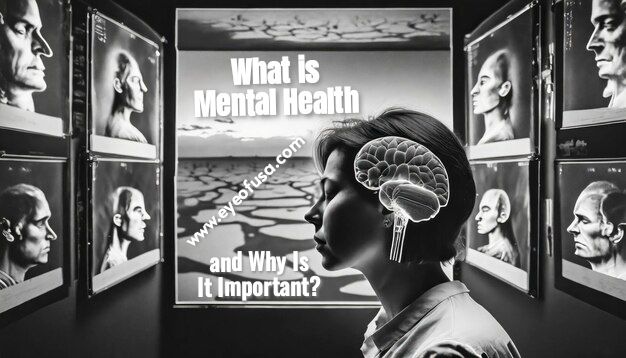Mental Health Awareness Facts: What You Need to Know?
1. What is Mental Health Awareness?
Mental health awareness is the recognition of the importance of mental health in our overall well-being. It involves raising awareness about mental health issues, educating people on how to recognize signs of mental illnesses, and breaking the stigma surrounding mental health conditions. The goal is to help individuals understand that mental health is just as important as physical health.
—
2. Why is Mental Health Awareness Important?
Mental health affects how we think, feel, and act. Awareness plays a crucial role in creating a supportive environment where people feel comfortable seeking help when needed. By educating ourselves and others, we can improve the lives of those struggling with mental health challenges, reduce stigma, and encourage early intervention.
—
3. What Are the Key Facts About Mental Health?
Mental Health Statistics
Did you know that 1 in 5 adults in the U.S. experience mental illness every year? This translates to over 51 million people. Globally, over 450 million people are affected by mental health conditions. Mental health issues can affect anyone, regardless of age, gender, or background.
Common Mental Health Disorders
Mental health disorders vary in type and severity. Common conditions include:
Anxiety Disorders: Affects 18% of the population.
Depression: The leading cause of disability worldwide.
Bipolar Disorder: Affects 2.8% of the U.S. adult population.
Post-Traumatic Stress Disorder (PTSD): Can affect anyone who has gone through trauma.
—
4. How Does Mental Health Impact Daily Life?
Mental health issues can affect a person’s emotional, social, and physical well-being. Individuals with untreated mental health disorders may experience difficulties in relationships, work, and managing day-to-day activities. However, with proper care and support, individuals can manage their conditions and lead fulfilling lives.
—
5. What is the Stigma Surrounding Mental Health?
Despite significant progress, stigma around mental health still exists. People often avoid seeking help due to fear of judgment or discrimination. This can lead to prolonged suffering and even worsen mental health conditions. By continuing to talk openly and educate people about mental health, we can reduce stigma and encourage more people to seek support when needed.
—
6. Where Can You Find Mental Health Resources and Support?
Mental health support is available through a variety of channels:
Mental Health Professionals: Psychologists, counselors, and psychiatrists can help individuals manage mental health disorders.
Hotlines and Helplines: The National Suicide Prevention Lifeline (1-800-273-TALK) and other resources provide immediate support.
Online Resources: Websites like www.mentalhealth.gov provide valuable tools and information for managing mental health.
—
7. How Can We Promote Mental Health Awareness?
Promoting mental health awareness involves individual, community, and organizational efforts. Here are some ways to get involved:
Talk openly about mental health: Normalizing conversations helps reduce stigma.
Support mental health campaigns: Join or support initiatives that promote mental health education.
Use social media: Share mental health facts and resources to reach a wider audience.
—
8. What Are Common Myths About Mental Health?
There are many myths and misconceptions about mental health, including:
Myth: Mental health disorders are rare. Fact: Mental health conditions are more common than you think. 1 in 5 adults experiences a mental health issue.
Myth: People with mental health issues can’t lead successful lives. Fact: With proper treatment and support, people with mental health conditions can lead fulfilling lives.
Myth: Mental health issues are just a phase. Fact: Mental health conditions are often long-term and require professional treatment.
—
9. Why is Mental Health Education Important in Schools and Workplaces?
Incorporating mental health education into schools and workplaces can significantly improve the well-being of individuals. Schools can teach students how to manage stress and seek help, while workplaces can offer support through Employee Assistance Programs (EAPs). Promoting mental health education ensures that people understand the importance of mental health from an early age and continue to practice mental well-being throughout their lives.
—
10. How Can You Help a Loved One with Mental Health Issues?
If someone you care about is struggling with mental health issues, it’s important to offer support without judgment. Encourage them to seek professional help and be a listening ear. Remember, it’s crucial to be patient and understanding, as recovery can take time.
—
11. FAQs About Mental Health Awareness
What are the signs of mental health problems?
Signs of mental health problems may include persistent sadness, anxiety, mood swings, withdrawal from social activities, and changes in eating or sleeping habits.
How can I help a loved one with mental health issues?
Encourage them to seek help, offer emotional support, and avoid making judgments. Let them know they are not alone and that you care.
What are the benefits of mental health awareness campaigns?
Mental health awareness campaigns help reduce stigma, promote early intervention, and provide information on available resources and support.
—
Conclusion: The Importance of Mental Health Awareness
Mental health awareness is vital in helping individuals recognize the importance of mental health and seek the support they need. By promoting education, reducing stigma, and providing resources, we can create a society where mental well-being is prioritized. At www.EyeOfUSA.com, we believe that mental health is just as important as physical health, and we encourage everyone to take steps toward a healthier, more aware future.


